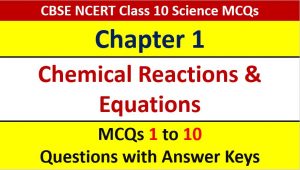If you are preparing for CBSE Class 12 Board Exam Term 1 which will be an objective type questions paper, then you need to practice multiple choice questions of Class 12 Chemistry Chapterwise. In this article of AKVTutorials, you will get MCQ Questions for Class 12 Chapter 6 General Principles and Processes of Isolation of elements with Answer Keys.
MCQ Questions for Class 12 Chemistry Chapter 6 Question No 1:
A few elements like carbon, Sulphur, gold and nobel gases, occur in _____ state while others in _____ form, in the earth’s crust
Option A : combined, free
Option B : free, combined
Option C : liquid, solid
Option D : gas, liquid
Show/Hide Answer
Option B : free, combined
MCQ Questions for Class 12 Chemistry Chapter 6 Question No 2:
Which of the following is not an ore of iron ?
Option A : Siderite
Option B : Hematite
Option C : Limonite
Option D : Dolomite
Show/Hide Answer
Option D : Dolomite
MCQ Questions for Class 12 Chemistry Chapter 6 Question No 3:
When hematite is reduced in Blast furnance _____ gas is released
Option A : Carbon monoxide
Option B : Carbon dioxide
Option C : Oxygen
Option D : Hydrogen
Show/Hide Answer
Option B : Carbon dioxide
MCQ Questions for Class 12 Chemistry Chapter 6 Question No 4:
Carbon (as coke or charcoal), through a reducing agent, is not used in the extraction of aluminium because ______.
Option A : carbon gets oxidized to carbon monoxide which is a poisonous gas
Option B : carbon may also be left in the metal as an impurity which can be removed afterwards
Option C : It also acts as the fuel to provide heat in the process
Option D : The temperature needed for the carbon reduction is too high to be economical
Show/Hide Answer
Option D : The temperature needed for the carbon reduction is too high to be economical
MCQ Questions for Class 12 Chemistry Chapter 6 Question No 5:
If reactants and products of two reactions are put together in a system and the net ΔG of the two possible reaction is negative, the overall reaction will take place . These reactions are called ____.
Option A : redox reaction
Option B : coupled reaction
Option C : ionic reaction
Option D : addition reaction
Show/Hide Answer
Option B : coupled reaction
MCQ Questions for Class 12 Chemistry Chapter 6 Question No 6:
97% Zinc is known as ______.
Option A : Zinc blende
Option B : Zinc pyrites
Option C : Blister zinc
Option D : Zinc spelter
Show/Hide Answer
Option D : Zinc spelter
MCQ Questions for Class 12 Chemistry Chapter 6 Question No 7:
Sometimes there are two sulphides in an ore, which are separated by using ____.
Option A : Collectors
Option B : froth stabilizers
Option C : Depressants
Option D : Leaching
Show/Hide Answer
Option C : Depressants
MCQ Questions for Class 12 Chemistry Chapter 6 Question No 8:
During the formation of metal oxides from metal and oxygen, what will happen to the change in Gibbs free energy with the little increase of temperature?
Option A : Increases
Option B : Decreases
Option C : Remains same
Option D : Insufficient data
Show/Hide Answer
Option A : Increases
MCQ Questions for Class 12 Chemistry Chapter 6 Question No 9:
The concentrated ore must be converted into a form which is suitable for ____. Generally, the ___ ore is converted to oxide before reduction
Option A : reduction, sulphide
Option B : oxidation, sulphide
Option C : reduction, carbonate
Option D : oxidation, carbonate
Show/Hide Answer
Option A : reduction, sulphide
MCQ Questions for Class 12 Chemistry Chapter 6 Question No 10:
Ellingham diagrams are plots drawn between ___ and ___ for the formation of oxides
Option A : Temperature and change in enthalpy
Option B : Change in Gibbs free energy and Pressure
Option C : Change in Gibbs free energy and Temperature
Option D : Change in enthalpy and Pressure
Show/Hide Answer
Option B : Change in Gibbs free energy and Pressure

